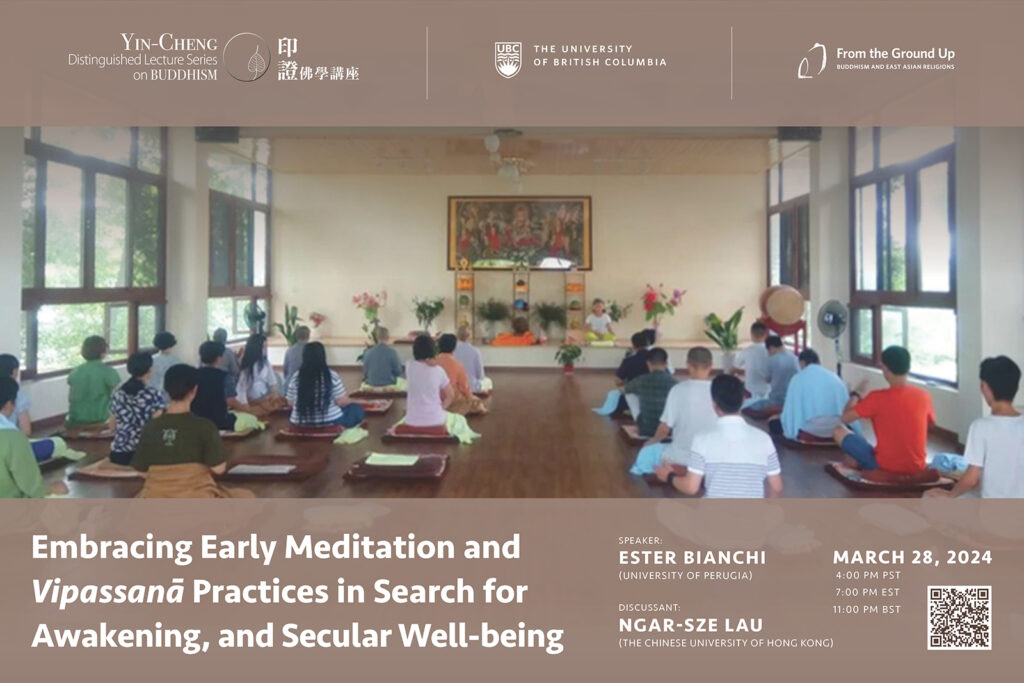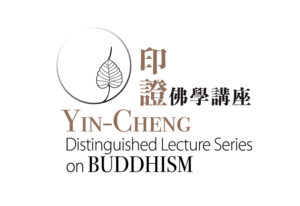Time: March 28, 4:00 pm (Vancouver) | 7:00 pm (New York) | 11:00 pm (London) | March 29, 7:00 am (Beijing/Taipei)
Room 604, Asian Centre, UBC
The lecture will be in person and live-streamed via YouTube with simultaneous English and Mandarin channels.
Abstract:
There has been a surge of interest in earlier meditation techniques as well as in Theravāda meditation, particularly vipassanā, throughout the Sinitic world over the past few decades. These Theravāda-inspired meditation techniques, whether rediscovered in canonical scriptures or newly introduced from South-East Asia, retain the allure of being early Buddhist practices and are welcomed as such by their Chinese followers. Many Buddhists adopt them as part of their practices in search of alternative techniques than those traditionally available within Chinese Buddhism. The venues for these practices include mainstream Chinese monasteries, a few Theravāda monasteries, and a large number of secular meditation centers. Practitioners joining meditation retreats range from committed Buddhists to practitioners interested in the positive effects on mental and physical well-being.
The presentation will introduce the popularity of earlier meditation practices such as breath mindfulness and other forms of satipaṭṭhāna, and of forms of modern vipassana. It will examine the practitioners’ motivations, while also addressing the implications of this phenomenon for social well-being.
About the speaker: Ester Bianchi (University of Perugia)

Ester Bianchi holds a Ph.D. in ‘Indian and East-Asian Civilization’ from the University of Venice (co-tutorial Ph.D. received from the Ecole Pratique des Hautes Etudes, Section des Sciences Religieuses of Paris). She is associate professor of Chinese Religions and Philosophy and of Society and Culture of China, coordinator of the Double Degree in “World Religions and Philosophy” (with the Department of Religious Studies of Fu-Jen University, Taipei), and member of the research group “Culture, Languages, Practices (CLIPRA) at the Philosophy Department of the University of Perugia (Italy). She is also external associated researcher of the Groupe Sociétés, Religions, Laïcités CNRS-EPHE (since 2012) and Research fellow of the Wutai International Institute of Buddhism and East Asian Cultures (since 2016). Her studies focus on the religions of China, particularly on Buddhism, both in imperial and in modern and contemporary time; her research is centered on Sino-Tibetan Buddhism, Chinese Buddhist monasticism, the revival of Buddhist monastic discipline and, more recently, the spread of Theravāda Buddhist Model in modern Chinese Buddhism.
About the discussant: Ngar-sze Lau (The Chinese University of Hong Kong)

Ngar-sze Lau is a Senior Lecturer at the Chinese University of Hong Kong, and affiliated Assistant Professor (part-time) of Department of Buddhist Studies, Fo Guang University. She completed her MPhil degree in Social Anthropology at Oxford and PhD degree in Religious Studies at Lancaster. Her research interests include contemplative education, lay Buddhist meditation, and transnational meditation movement in contemporary Chinese societies. She has published academic papers in Religions, Asian Medicine and Routledge International Handbook of Religion in Global Society, etc.
About the Yin-Cheng Distinguished Lecture Series: Launched in September, 2021, the Yin-Cheng Distinguished Lecture Series (印證佛學傑出學術系列講座) is a collaborative, multi-university partnership between Peking University, University of Oxford, University of Cambridge, Inalco (Institut national des langues et civilisations orientales), Princeton University, Harvard University, and the University of British Columbia. The Lecture Series is established in honour of Venerable Cheng-yen 證嚴, founder of Tzu Chi, and her mentor Yinshun 印順 (1906–2005), with the goal of promoting topics in Buddhist Studies.
Click to download the poster











